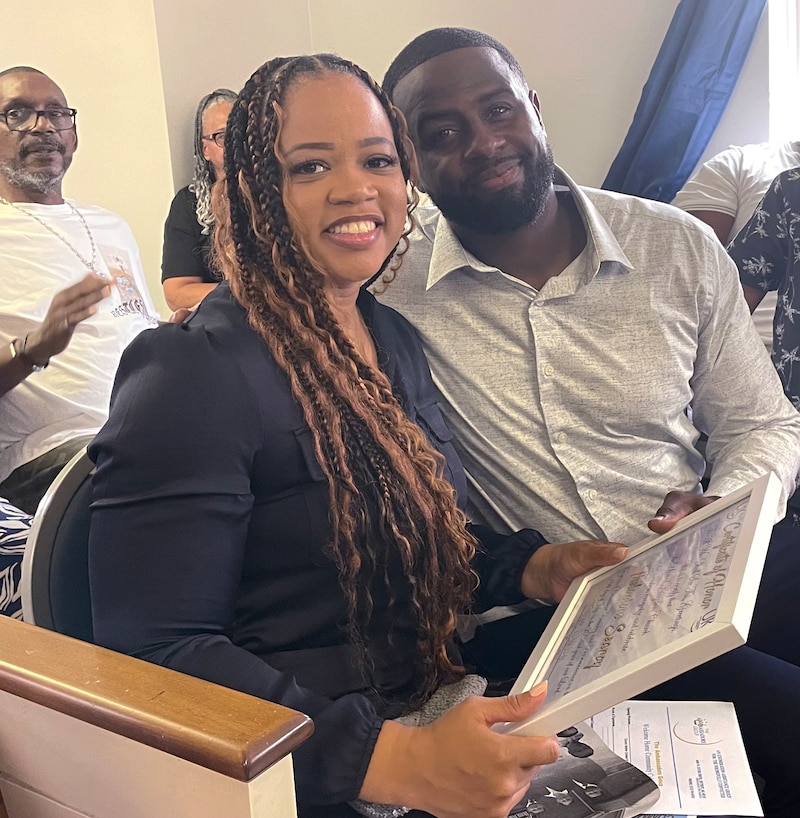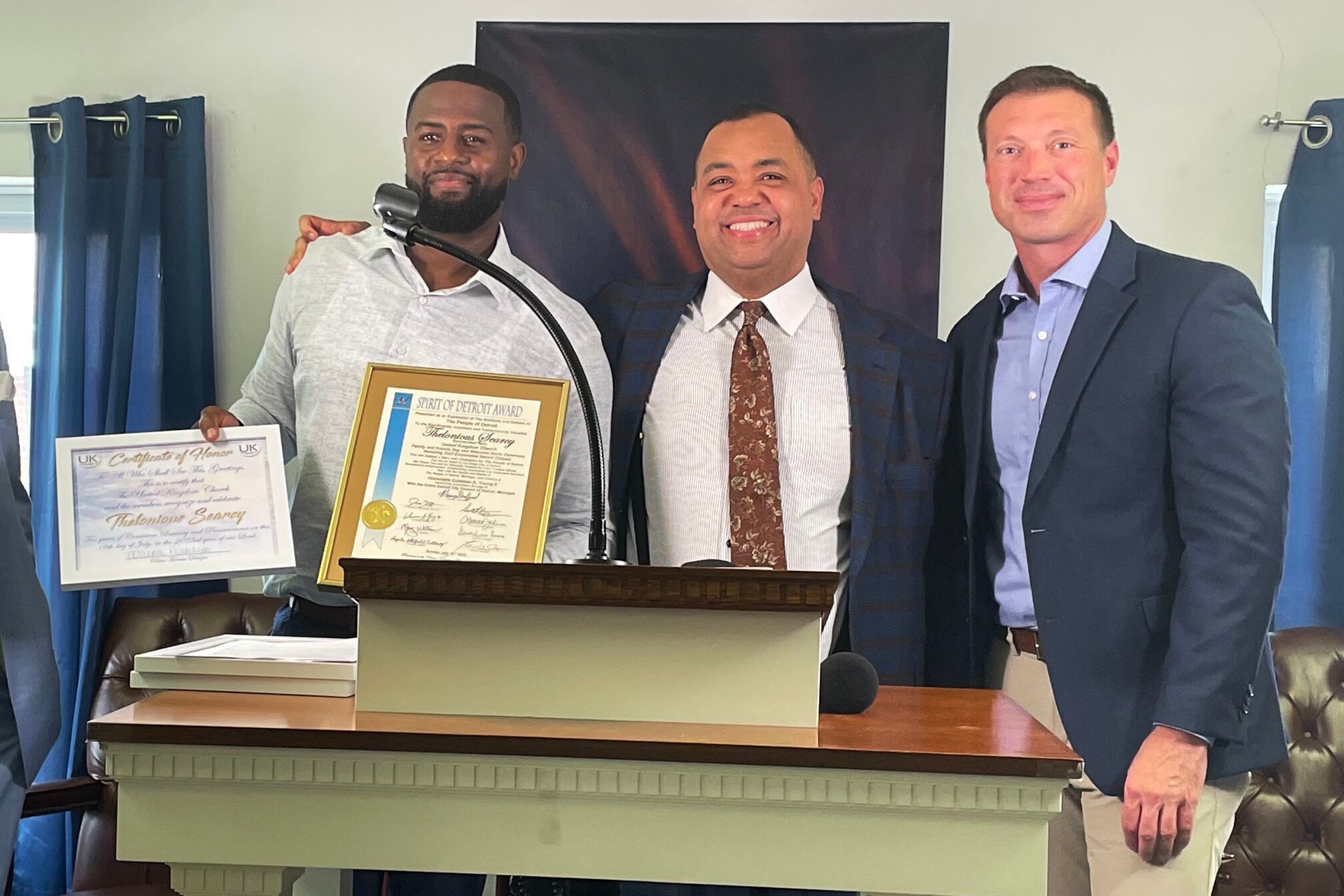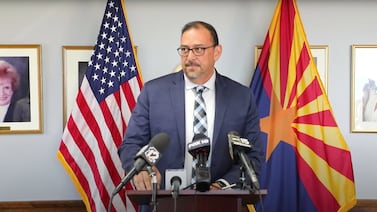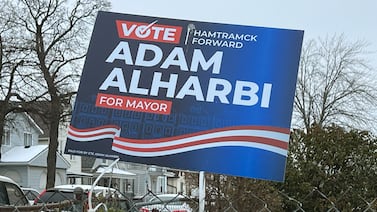Votebeat is a nonprofit news organization reporting on voting access and election administration across the U.S. Sign up for our free newsletters here.
It’s been nearly a decade since Vince King cast his first vote, and that act of filling out a ballot still resonates with him.
“Imagine what it’s like for a person who has never done it,” King recalls. “It made me feel free and part of the process.”
King hadn’t voted before his federal drug crime conviction put him behind bars, but when he did, “it made me feel proud,” said King, 55. It was a big deal to him when he put on his “I Voted” sticker.
Now a peer counselor for the social services group Detroit Rescue Mission Ministries, King wants other people previously convicted of felonies to vote. He’s hoping new legislation aimed at helping people on parole to register will enable more of them to become voters.
House Bill 4534 would require the Michigan Department of Corrections to provide both identification and information about voter registration to people who have been convicted of felonies upon their release from prison.
An estimated 6,500 people incarcerated in Michigan’s prison system are expected to be released this year, according to the Department of Corrections, and 95% of them will be released on parole. The system has a total of 32,816 people currently imprisoned.
If passed by the state Legislature, the bill will help newly released people join 8 million other Michigan residents who regularly vote by equipping them with identification and preparing them to make decisions at the ballot box that could impact their lives.
“When you learn about politics and how it impacts your life, you go out and vote,” said King.
In Michigan, unlike many other states, those who have served their sentences immediately have their voting rights restored upon release.
State Rep. Erin Byrnes, one of HB 4534’s sponsors and a Democrat who represents the southeast Michigan district that includes Dearborn, said the legislation is hugely important for those getting out of prison because many don’t know they have the right to vote upon release.
“They will get the opportunity to cast their vote for people who are making decisions on the justice system,” said Byrnes, who previously taught in a Michigan women’s prison.
Byrnes said she feels optimistic about the bill’s prospects. It has drawn no public opposition, though lawmakers have yet to schedule a hearing on it.
Michigan Department of Corrections spokesman Kyle Kaminski says the state’s prison system already has a “robust” program of preparing imprisoned people for re-entry back into their communities, including providing them with identification, such as birth certificates, Social Security cards, state identification, and military service records for veterans. But the department does not currently provide voter registration information, Kaminski said.
Byrnes hopes to win support for the bill because of its “empowering” effect on would-be voters.
“Michigan is leading the way in voting rights, and this is an area that we can grow in,” said Byrnes.
Uneven landscape for post-incarceration voting rights
Nicole Porter, senior director of advocacy for the Washington, D.C.-based Sentencing Project, whose goal is to end mass incarceration through research and advocacy, said many previously incarcerated people wrongly believe they have lost the right to vote even after serving their time.
“People don’t understand that they have the right to vote,” said Porter. “It’s certainly a move in the right direction for Michigan to introduce this legislation.”
And while formerly incarcerated people in Michigan have their voting rights automatically restored once they walk out of prison, that is not the case in 25 other states, according to the National Conference of State Legislatures.
In some cases, formerly incarcerated people in Florida are not able to vote unless they receive a pardon from the governor or clemency from the clemency board, said Porter. In 2018, Florida voters passed an amendment to the state’s constitution that automatically restores voting rights to individuals who were formerly incarcerated after they have completed the terms of their sentence, including completing parole, probation and payment of fines and fees. But advocates and observers say implementation of Amendment 4 has been beset by problems including bureaucratic bottlenecks of old records standing in the path of getting back voting rights.
“These are people living in the community, paying taxes, expected to be good neighbors following the completion of a sentence, and yet they are denied the right to vote,” said Porter.
In Tennessee, people seeking to have their voting rights reinstated must submit a formal petition. The state’s process requires fines and fees to be fully paid off, including court debt and child support arrears, Porter said.
In Mississippi, convictions of certain felonies, including theft of timber, carry a penalty of lifetime disenfranchisement. Upon release, a person convicted of such a felony and wishing to vote must ask a state lawmaker to introduce legislation to restore his or her individual voting rights, and get two-thirds of the Senate to approve the bill.
Critics of the Mississippi law say it was designed to permanently disenfranchise Black people who, the architects of the law believed, were more likely to commit certain felonies. This month a panel of judges from the 5th Circuit Court of Appeals struck down the law but the state plans to appeal the court’s ruling.
Alabama and Virginia still have lifetime disenfranchisement of voting rights for those convicted of felonies including murder, kidnapping, rape, and property crimes.
According to the Sentencing Project, more than one in 10 Black adults in eight states have lost their voting rights: Alabama, Arizona, Florida, Kentucky, Mississippi, South Dakota, Tennessee, and Virginia.
Two states, Maine and Vermont, along with the District of Columbia and the U.S. territory of Puerto Rico, allow people to vote while in prison.
Liz Avore, senior advisor to the Voting Rights Lab, applauds Michigan lawmakers for introducing HB 4534, saying it is important for formerly incarcerated people to have access to good information about voting as they rejoin their communities, and legislation like it has drawn bipartisan support elsewhere.
But the laws re-enfranchising people previously incarcerated for felonies might not necessarily be translating into more voter participation, Avore says.

“A lot of times when we see these changes made, we’re not seeing the corresponding increase in numbers of voters taking advantage of their new eligibility,” she said. “There’s a lot of legislation like this bill in Michigan attempting to remedy that by educating people about when they are able to vote, and about how to do it, and to, kind of, demystify the process around voter registration.”
For Thelonious Searcy, who was exonerated in April 2021 for a 2004 murder on Detroit’s east side, House Bill 4534 could put a lot of people previously convicted of felonies on the path to becoming active voters, something many of them wished for while they were serving their sentences.
“We watched a lot of politics when we were behind bars,” said Searcy, 43. “Once you get in a situation like ours, you say, ‘I want to vote for someone who’s going to bring forth change.’ Just because we’re in prison, it impacts us too.”
Searcy says he is looking forward to voting in next year’s general election.
“Next year I will be voting. I will be voting,” said Searcy. “Before I went to prison I didn’t vote. I left the streets at the age of 24 and I had never voted before.”
Oralandar Brand-Williams is a senior reporter for Votebeat in partnership with Bridge Michigan. Contact Oralandar at obrand-williams@votebeat.org.






